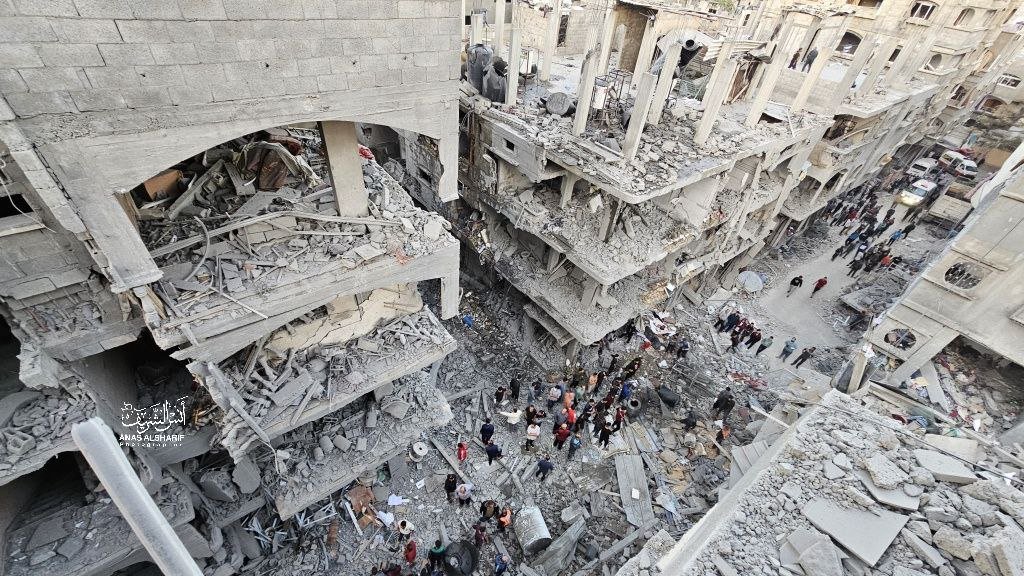The current talks are also in a race against time as Israel threatens to launch a full-scale invasion of Rafah, where at least 1.4 million displaced Palestinians are taking shelter.
Israel’s war cabinet is reportedly sending a delegation to Qatar “in the coming days” to follow up on talks over a possible new Gaza deal following reported progress during Friday’s Paris meeting, according to Barak Ravid of Axios.
The delegation will meet with Qatari officials for follow-up talks on the humanitarian aspects of a possible captives exchange deal, a source familiar with the issue told Ravid.
“He said the talks will be technical and the Israeli delegation will have a limited mandate,” Ravid said in a post on X on Saturday, citing unnamed sources.
Qatar has yet to publicly comment on the delegation’s reported visit.
Talks over a possible Gaza deal in Paris on Friday with Qatari, Egyptian and American officials reportedly witnessed progress, though officials cautioned that the talks were still far from an agreement, two sources privy to the matter told Axios on Saturday.
The meeting took place in the French capital following a previous one on January 28 with the attendance of officials from Qatar, Egypt, the U.S., and Israel.
A previous meeting ended with a draft proposal that entailed a phased release of captives under several pauses. Hamas demanded a ceasefire and full withdrawal of Israeli forces, which Israel rejected.
The new framework proposal brought during the latest Paris meeting involved the release of 35-to-40 Israeli captives from Gaza, including women, female soldiers, captives with serious medical conditions, and men over 50, the sources told Axios.
The release would take place in exchange for a six-week truce, the sources added.
Hundreds of Palestinian detainees held in Israeli prisons would be released from within the same period while allowing some Palestinians to return to northern Gaza and increasing the entry of aid.
A senior U.S. official told Axios that “some progress made in the hostage talks in Paris on Friday, but more ways to go to get a deal”. An Israeli official separately said the talks “are still far away from a deal but Hamas caved on some of its demands”, without detailing them.
Last year, Qatar and Egypt mediated a truce that lasted between November 24 and December 1, enabling the release of at least 110 Israeli and foreign captives from Gaza.
The captives’ release came in exchange for the release of 240 Palestinian women and children from Israeli prisons.
The Israeli genocidal war has neared its fifth month with at least 29,692 Palestinians killed, 69,879 wounded and more than 80% of Gaza’s population displaced.
Negotiators have been working towards a possible truce ahead of the fasting month of Ramadan, a source familiar with the mediation efforts told CNN last week. The source described the upcoming two weeks of negotiations as “pivotal.”
The current talks are also in a race against time as Israel threatens to launch a full-scale invasion of Rafah, where at least 1.4 million displaced Palestinians are taking shelter.
On Saturday, Israeli Prime Minister Benjamin Netanyahu announced plans to approve the Rafah operation with the war cabinet.
“At the beginning of the week, I will convene the cabinet to approve the operational plans for action in Rafah, including the evacuation of the civilian population from there. Only a combination of military pressure and firm negotiations will lead to the release of our hostages, the elimination of Hamas and the achievement of all the war’s objectives,” Netanyahu said in a post on X.
Hunger in Gaza has been on the rise under the complete Israeli air, land and sea blockade of the Strip and the chokehold over the entry of aid. The situation in northern Gaza is deteriorating as people in Rafah stop incoming trucks to receive aid.
Palestinian media reported this week that a two-month old baby, Mahmoud Fattouh, died of malnutrition at the Al Shifa Hospital in Gaza City.
“There is an urgent need to augment the fleet of delivery trucks to ensure the entire population’s nutritional requirements are met and to improve healthcare services, including primary health services,” the United Nations said in its flash update on February 23.







